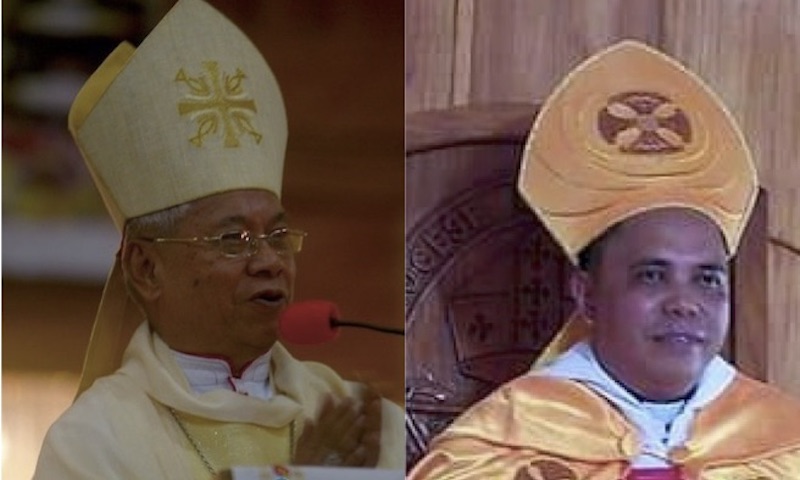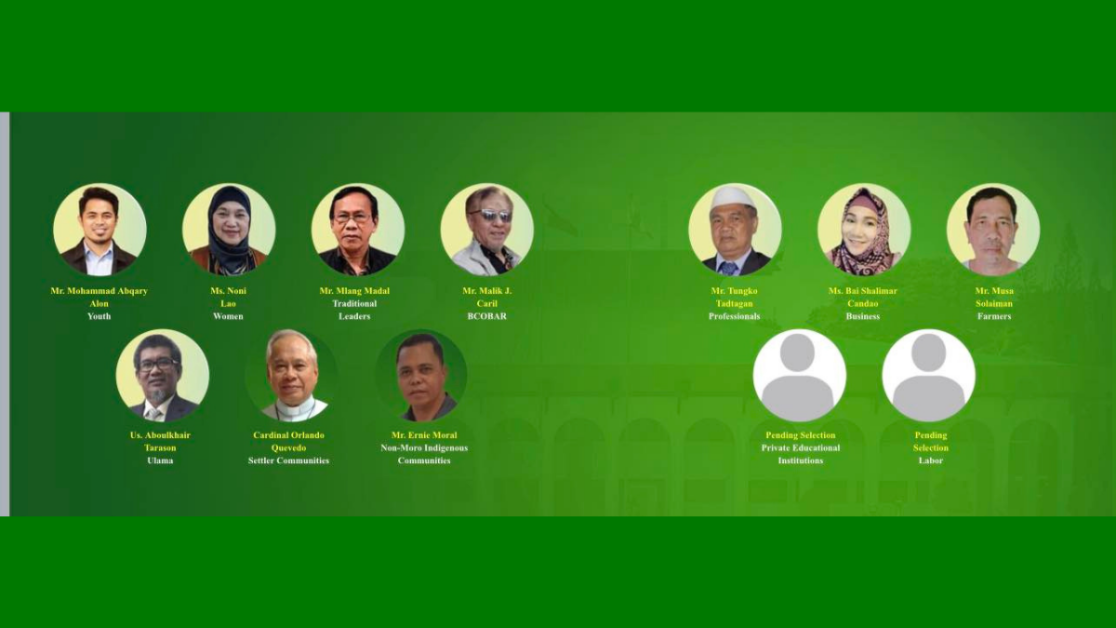DAVAO CITY (MindaNews / 06 August) – The interim C
hief Minister of the Bangsamoro Autonomous Region in Muslim Mindanao will convene in Davao City on August 9 its Council of Leaders, whose members include two non-Moro religious leaders : Cardinal Orlando Quevedo, Archbishop Emeritus of the Archdiocese of Cotabato, representing “settler communities,” and Bishop Ernie Moral of the Episcopal Diocese of Southern Philippines, a Teduray from South Upi in Maguindanao del Sur, representing Non-Moro Indigenous Peoples (NMIP).
The Council of Leaders serves as adviser to the Chief Minister “on matters of governance” in the BARMM.
Chief Minister Ahod “Al Haj Murad” Ebrahim notified Quevedo on his selection in a letter dated July 14. Before Quevedo, Troy Cordero, who passed away in June 2023, represented the settlers.
 Four-year old Sittie Zareenah Ebrahim wonders who is seated beside her grandpa, MILF chair Al Haj Murad Ebrahim (right) onstage at the Central Committee Convention Hall in Camp Darapanan, Sultan Kudarat, Maguindanao on July 25, 2015. Murad discussed the peace process in a dialogue with media, moderated by Mindanao’s lone Cardinal, Orlando B. Quevedo (left). MindaNews file photo by TOTO LOZANO
Four-year old Sittie Zareenah Ebrahim wonders who is seated beside her grandpa, MILF chair Al Haj Murad Ebrahim (right) onstage at the Central Committee Convention Hall in Camp Darapanan, Sultan Kudarat, Maguindanao on July 25, 2015. Murad discussed the peace process in a dialogue with media, moderated by Mindanao’s lone Cardinal, Orlando B. Quevedo (left). MindaNews file photo by TOTO LOZANO
According to Section 9 of Republic Act 11054 or the Organic Law for the BARMM, the Council of Leaders is headed by the Chief Minister and its members are provincial governors, mayors of chartered cities in the region and congressional representatives in the region.
BARMM has six provinces (Basilan, Lanao del Sur, Maguindanao del Norte, Maguindanao del Sur, Sulu and Tawi-Tawi), three cities (Marawi, Lamitan and Cotabato), and the Special Geographic Area in North Cotabato consisting of 63 barangays in six towns. The region has eight congressional districts.
The Council’s other members are representatives of traditional leaders, non-Moro indigenous communities, women, settler communities, the Ulama, youth, and Bangsamoro communities outside of the Bangsamoro Autonomous Region; and representatives of other sectors. For these sectors, the mechanism of representation and number of representatives “shall be determined by the Parliament.” The representation of the non-Moro indigenous communities in the Council of Leaders “shall be pursuant to their customary laws and indigenous processes.”
 Cardinal Orlando B. Quevedo, OMI (L) and Episcopal Bishop Ernie Moral. Quevedo file photo by TOTO LOZANO, Moral photo from the Espicopal Diocese of Southern Philippines
Cardinal Orlando B. Quevedo, OMI (L) and Episcopal Bishop Ernie Moral. Quevedo file photo by TOTO LOZANO, Moral photo from the Espicopal Diocese of Southern Philippines
According to a briefer from the Office of the Chief Minister (OCM), aside from Quevedo and Moral, the other members are Engr. Malang Utto Madal of Datu Piang, Maguindanao del Sur, who will represent Traditional Leaders; Noni Lao Lao of Marawi City, representing Women; Mohammad Abqary Alon of Sultan Kudarat, Maguindanao, representing the Youth; Tungko Benito Tadtagan, an Iranun/Maguindanaon from Cotabato City, representing Professionals.
The business sector is represented by Shalimar Amerkhan Candao, an Iranun/Maguindanaon from Cotabato City. Musa Tampal Solaiman of Kiamba in Sarangani, a province outside the BARMM, is representing Farmers.
 Non-government members of the BARMM’s Council of Leaders. The Labor representative is Faisal Nahul of Tawi-Tawi. Courtesy of the Office of the Chief Minister.
Non-government members of the BARMM’s Council of Leaders. The Labor representative is Faisal Nahul of Tawi-Tawi. Courtesy of the Office of the Chief Minister.
Malik J. Caril of Kabasalan in Zamboanga del Sur is representing the Bangsamoro Communities Outside BARMM while Faisal Nahul of Tawi-Tawi is representing the Labor sector.
The Council will also have a representative from Private Educational Institutions.
The OCM briefer said Bishop Moral was nominated by IP leaders, among them Members of Parliament Ramon Piang and Froilyn Mendoza, who are the Non-Moro IP representatives in the 80-member Bangsamoro Transition Authority (BTA), Commissioner Archie Buaya of the Bangsamoro Commission on Human Rights, Maguindanao del Norte IP Mandatory Representatives Guiamal Abdulrahman and IP Mandatory Rep. Abubakar Campong of Cotabato City.
Madal was nominated by the Sultan Anwarudin “Datu Utto” bin Sultan Bangon Descendants Association and League of the Bangsamoro Organization (LBO); Lao by the Federation of Women Royalty of Lanao Inc.; Alon by the United Voice for Peace Network; Tadtagan by the Bangsamoro Center for Just Peace, Inc. and LBO; Candao by the Nouru Salam National Women Council and LBO; and Caril by the Bangsamoro Provincial Consultative Council.
The briefer did not indicate who nominated Solaiman and Nahul.
The Council of Leaders is one of seven mechanisms of the Intergovernmental Relations Body (IGRB) composed of leaders from the national government and the regional officials.
In its July 27 meeting, Budget Secretary Amenah Pangandaman, who co-chairs the IGRB with MILF Peace Implementing Panel chair and concurrent BARMM Education Minister Mohagher Iqbal, reported that the IGRB has been able to reconvene and activate six out of seven IGR mechanisms cited in RA 11054 or the Organic Law for the BARMM.
“I am also glad to note that we have activated most of our IGR mechanisms. Out of the seven IGR mechanisms provided in the Bangsamoro Organic Law, six have already been reconvened,” Pangandanam said.
 ZAREENAH. Four-year old Sittie Zareenah Ebrahim wonders who is seated beside her grandpa, MILF chair Al Haj Murad Ebrahim (right) onstage at the Central Committee Convention Hall in Camp Darapanan, Sultan Kudarat, Maguindanao on Saturday afternoon, July 25. Murad discussed the peace process in a dialogue with media, moderated by Mindanao’s lone Cardinal, Orlando B. Quevedo (left). MindaNews photo by TOTO LOZANO
ZAREENAH. Four-year old Sittie Zareenah Ebrahim wonders who is seated beside her grandpa, MILF chair Al Haj Murad Ebrahim (right) onstage at the Central Committee Convention Hall in Camp Darapanan, Sultan Kudarat, Maguindanao on Saturday afternoon, July 25. Murad discussed the peace process in a dialogue with media, moderated by Mindanao’s lone Cardinal, Orlando B. Quevedo (left). MindaNews photo by TOTO LOZANO
“The last remaining mechanism, which is the creation of the Council of Leaders, is already scheduled to convene on August 9, 2023,” she added.
The other IGR mechanisms are the Philippine Congress-Bangsamoro Parliament Forum; Intergovernmental Fiscal Policy Board: Joint Body for the Zones of Joint Cooperation; Intergovernmental Infrastructure Development Board; Intergovernmental Energy Board; and Bangsamoro Sustainable Development Board. (Carolyn O. Arguillas / MindaNews)
